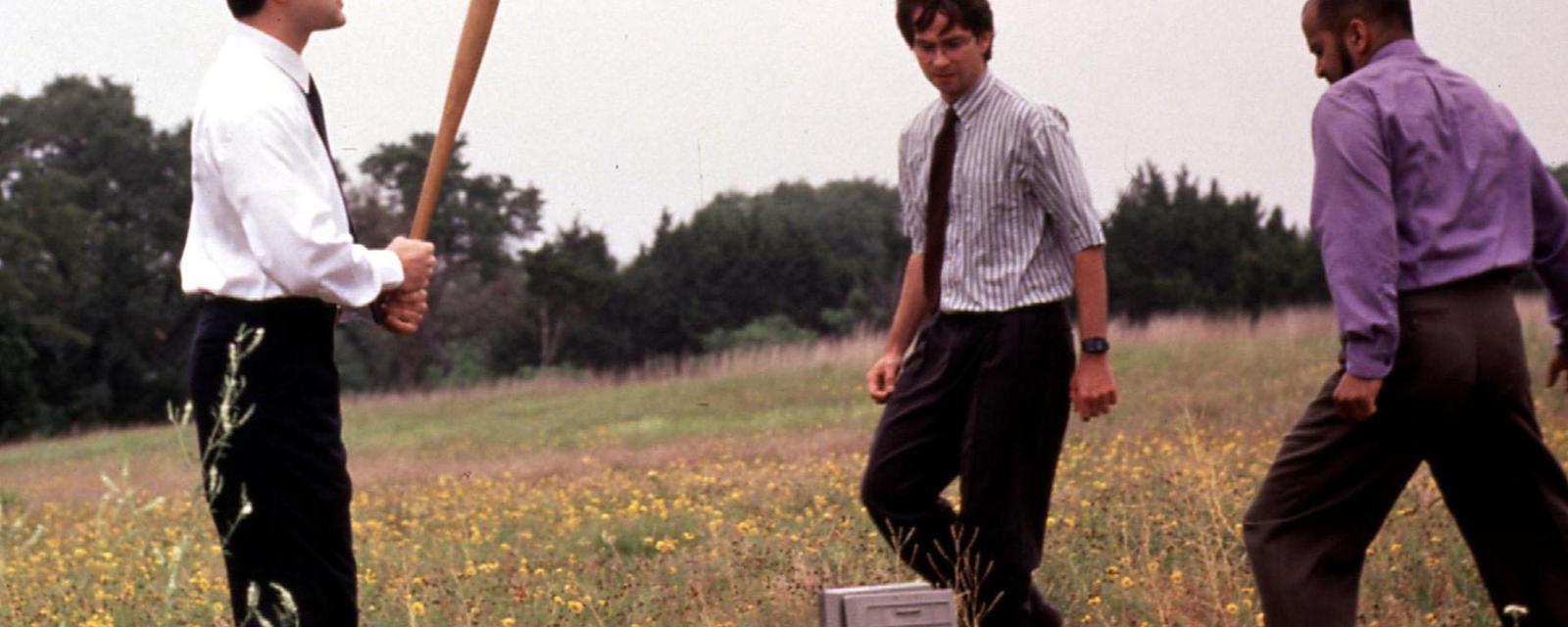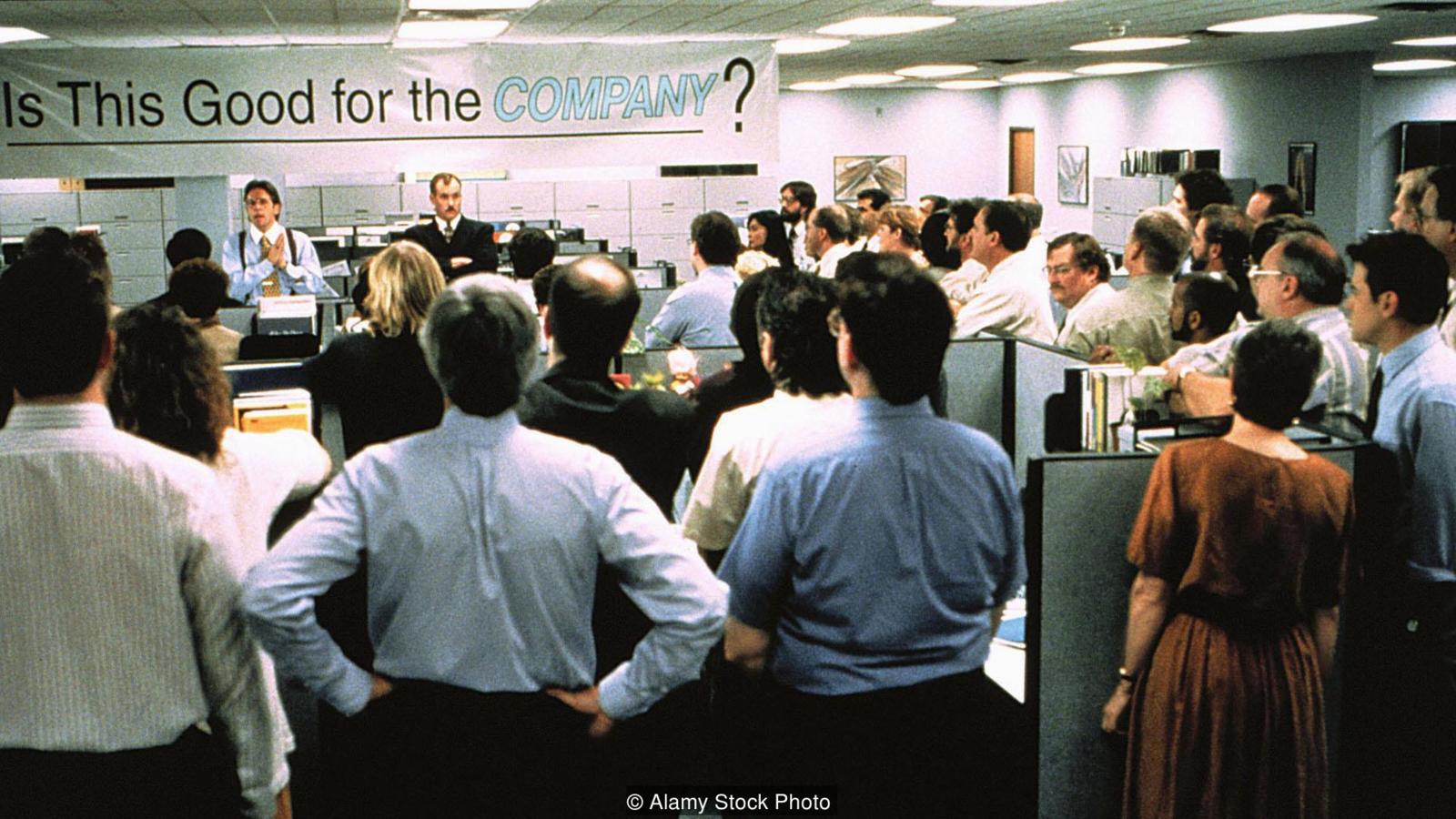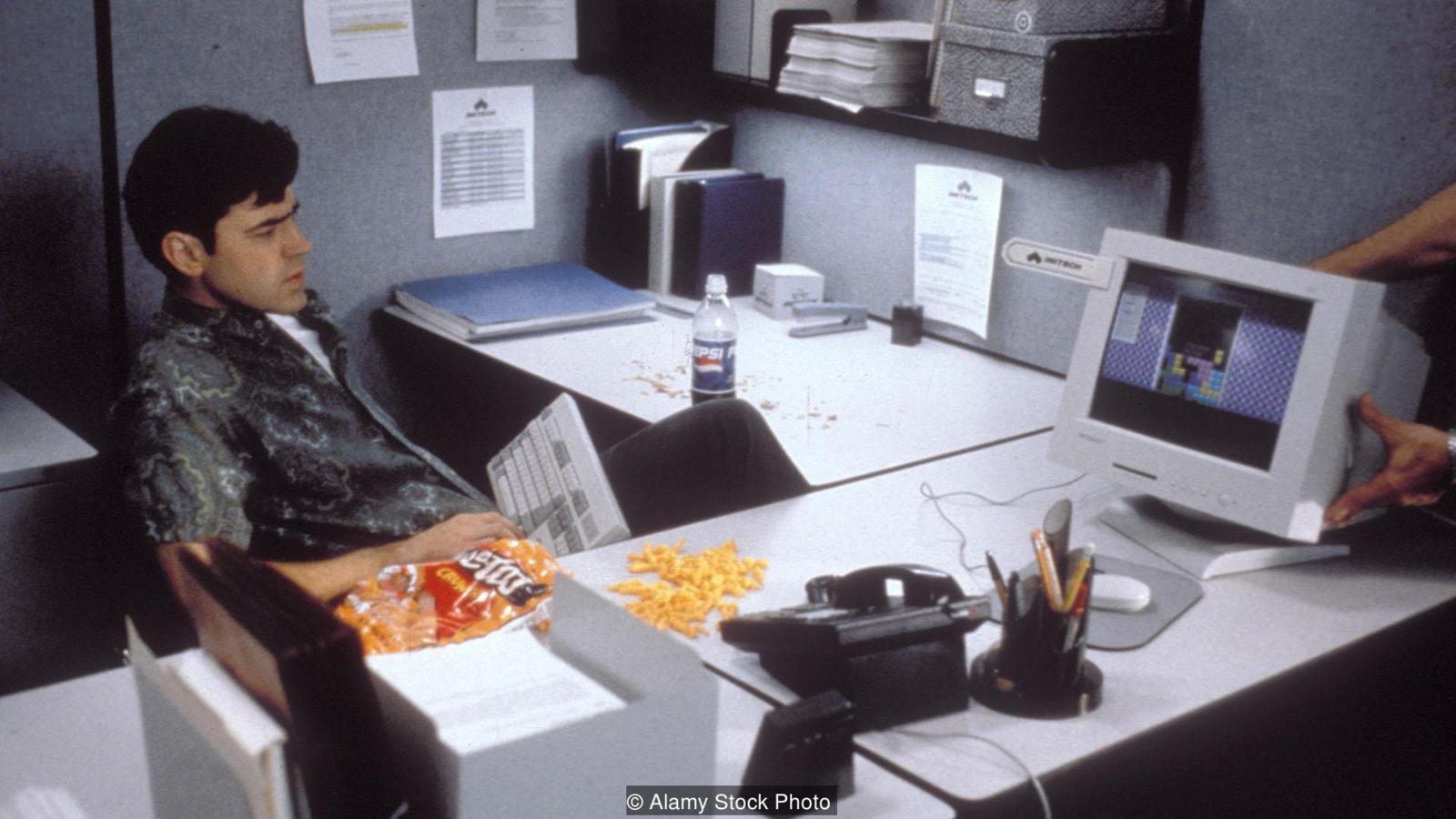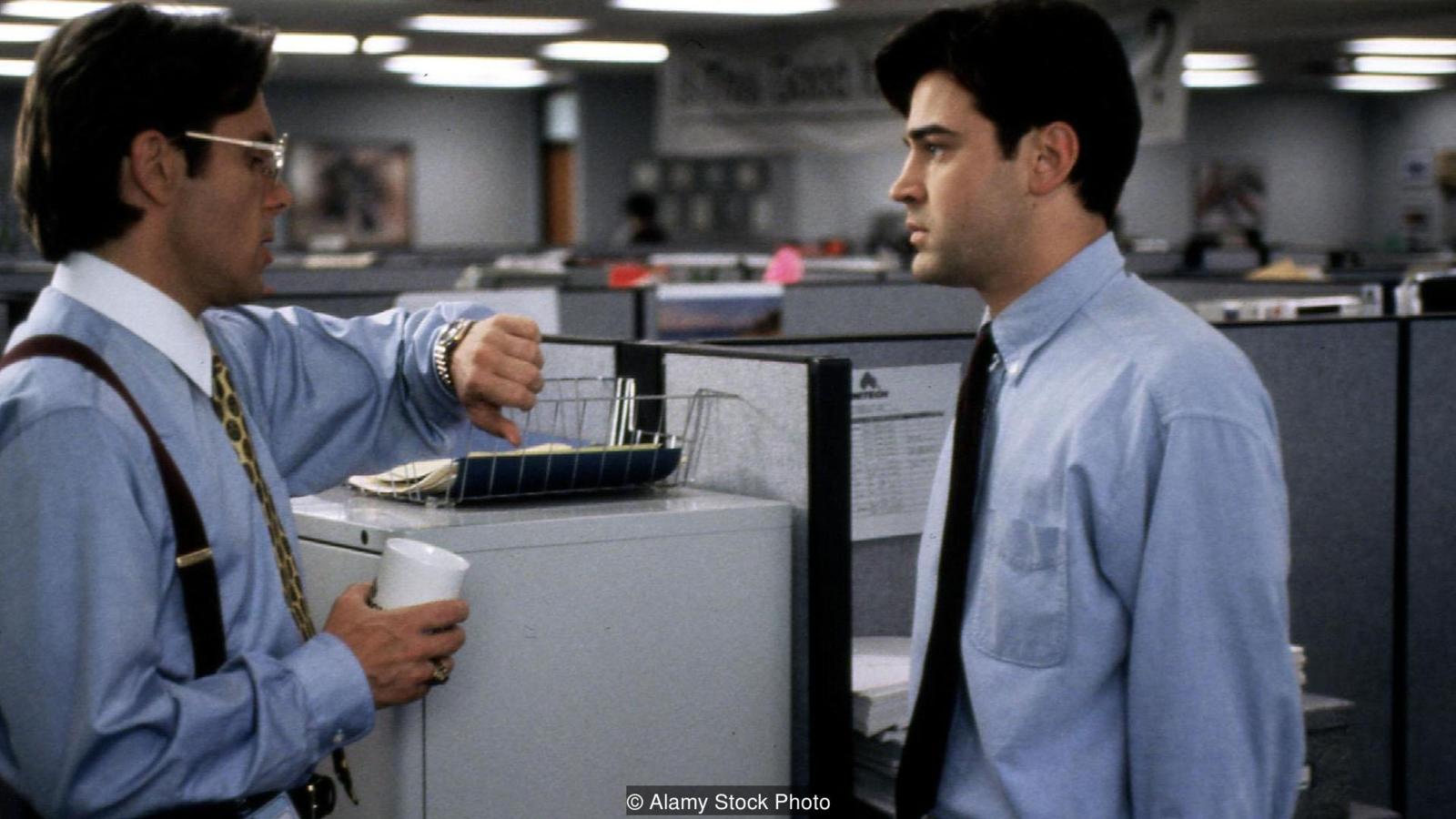The film "Office Space" 20 years: how he changed our jobs
In 1999, the film masterfully parodied both routine and ridiculous office life. What has changed since then?

“ Office Space ” has become a characteristic film, making fun of corporate platitudes. In February, he turned 20 years old, and if we reconsider it today, it becomes clear how much the office culture has changed - and how much remains the same.
The film , written and directed by Mike Judge , tells the story of Peter Gibbons, a young programmer from a firm with a generic name Initech. He has a small salary, he feels broken and finds his work meaningless, and the disappointment in his work ultimately inspires him to revolt against his superiors and corporate America.
The culmination of a rebellion is a catharsis, expressed through the destruction of the hated office printer in the open field by all, together with colleagues. After that, they are trying to steal hundreds of thousands of dollars from a company by hacking its corporate accounts with a virus.
')
The idea of the film, formulated by Peter's girlfriend, Joanna, who also hates her work as a waitress, is simple: “Peter, most people do not like their work. But you go there and find something that makes you happy. ”
Since this film was released in 1999, we are more and more thinking about the absurd and scary aspects of office life. But how well do we overcome these aspects? Should I thank for this movie?

The film helped to formulate on the screen a bleak, despotic corporate culture “company first”, which dominated white-collar workers in the 1990s.
What has changed in the world of work?
In the past few decades, parodies of white-collar office have grown into their own subgenre in pop culture.
Scott Adams comic about Dilbert was launched in 1989, and in 2001 the BBC began showing the original version of the television comedy “Office”. Both works ridiculed elements of the modern workplace: incompetent managers, stupid bureaucracy, forced holidays, endless useless work and office notes overflowing with jargonisms that no one reads.
“Office space” condemned such work - proclaiming the superiority of conformism and monotonous, both physically and mentally. In this context, you can see how many companies have responded to these calls with standing tables, meditation rooms and yoga , or special days when you can bring your dog to work.
The most striking example of working culture that we are trying to avoid is Peter’s forever-drinking coffee, Bill Lamberg. In his gold-framed glasses and a flowered tie, Lamberg resembles the legacy of company directors from the 80s, the era of " greed is good ." He is engaged in micromanagement and does not pay attention to the health and care of his subordinates. In one episode, he left 17 messages on his Peter answering machine on Saturday morning reminding him to go to work on a day off.
This leads Peter to his breakdown and to the revelation at the time he visits the hypnotherapist. He decides to completely stop worrying [more precisely, he is given such an installation / approx. trans.]. Enough is enough for him. He starts to be late, refuses from a tie and trousers in favor of T-shirts and sandals, openly plays at work in Tetris and dismantles his booth with a screwdriver.
Unexpectedly, this approach attracts the attention of two outside consultants, Bob and Bob, who were invited to remove unnecessary people from Initech. They chase many of Peter's colleagues, but the behavior of a jaded Peter seems to be a breath of fresh air, and they call him "suitable material for becoming a top manager."

Peter rebels against his toxic boss, eating Cheetos and playing Tetris at the workplace in casual clothes.
In this sense, the film turned out to be unexpectedly prophetic. Today, many directors behave in the image and likeness of Peter. I remember the Silicon Valley startups of the late 2000s and early 2010s, whose leaders refused to wear suits and proclaimed freedom and creativity in the workplace. Instead of equalizing booths, organizations switched to open office spaces with bean bags and ping-pong tables . Luminaries of business like Mark Zuckerberg deliberately refused shirts and ties in favor of hoodie and jeans, much like Peter does in the film.
But it's not just clothes. Zuckerberg and his ilk are a distraction and emergency exit from the monotonous office work, which the characters are actively pursuing. Many years later, this contempt for corporate life and the emergence of new technologies paved the way to the economy of part-time work and opened up more opportunities to become one’s own boss .
But the situation has its drawbacks. Although new methods of work freed many from the domination of booths, they also gave rise to a “ fuss culture ”, forcing entrepreneurs and independent workers to burn at work, instead of having an omnipresent boss like Lamberg doing it for them.
In this sense, many of the problems highlighted in the film still exist today, just in a different form.
What hasn't changed at all?
Many of the comments of the film are still relevant, which indicates the existence of eternal problems, which are trapped by office workers.
Some of the “solutions” designed to get rid of office boredom seem artificial — like pinball or table football machines that have become symbols of stereotypical startups. They now look as empty as the forced frivolity of the “Friday of the Hawaiian shirts” mentioned in the film. Unless the HR department and managers apply real flexibility policies, these gestures remain meaningless.
And regardless of the casualness of the dress code or the number of game rooms, many of today's firms are still victims of the “company first” directive, ridiculed in the film.
Recent studies suggest that Facebook employees view its culture as “something of a cult,” despite historically anti-corporate values. Ilon Musk, director of Tesla, last year was criticized, saying that no one changed the world, working only 40 hours a week - apparently armed with the highest goal, which is absent in the working environment shown in the film, and using it to force recycling.

The overwhelming boss and the suffocating working culture depicted in the film reflected the reality that existed in the real working environment of white-collar workers.
There are other management problems that are displayed in the film and still exist. For example, one of Bobov tells a group of white managers that he wants to fire Peter’s colleague, Samir Naginanadjara. He constantly stumbles on the name of Samir, and eventually calls him, as "here-no longer working", under the grin of his colleague. Today, although large and small companies are trying to diversify their workforce, micro-aggressive everyday racism has not gone away.
Later, the Beans say they are not going to report to dismissed workers, recognized as superfluous, about this personally: “We would like to avoid confrontation whenever possible.” Avoiding unpleasant personal discussions today, thanks to technology, is easier than ever - over the years since the film's release, firms have been criticized for notifying of a dismissal by email or via voice message, via SMS or on Twitter .
Anger toward corporations that motivates Peter and his friends, still exists today. At the climax of the film, Peter and his friends are conducting a hacker attack designed to extort money from Initech bank accounts so that “they will never again have to sit in stalls.” They are ready to break the law in order to destroy the company, which seems to them spoiled and unfair. Similar scenarios unfold in today's realities - not in the form of comedies, but in the form of a sincere denunciation of capitalism and 1%, for example, in the popular television series “Mr. Robot”.
Film heritage
Although the “Office Space” fees were disappointing, in twenty years it has become a cult hit. Much has happened in these 20 years, including the global financial crisis, against which the boring work in the film seems like a luxury that white-collar workers take for granted.
Watching the film in 2019, it is easy to notice at what points we reacted and tried to change them, even if some of the changes were artificial. Still, the main theme of the film raises the question: can you actually find a job that you like? This question raises important discussions about the balance of work and personal life, as well as a decent career that continues today. Probably, these discussions will go on as long as jobs exist.
At the end of the film, after Initech is closed due to arson, Peter gets a job as a builder. Raking the ashes of his old company, he says that his new job is “not so bad: you earn money, you exercise, you work in the open air.” Fortunately for him, his attempt to commit a crime ended in nothing, and he learned an important lesson, at the same time as Initech suffered a well-deserved punishment.
But as a comment on bad management and inefficient work, the film remains relevant to this day. "Office space" reminds us that, although there is no perfect job, you should always pay attention to the disadvantages.
Source: https://habr.com/ru/post/442724/
All Articles